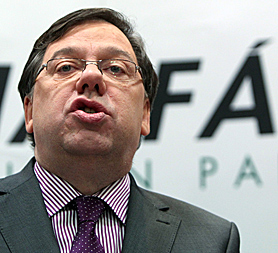Irish PM Brian Cowen steps down as Fianna Fail leader
Irish Prime Minister Brian Cowen has stepped down as leader of the ruling Fianna Fail party after a week of chaos in his party. Who are the contenders for the poisoned chalice?

The move follows a week of turmoil and a string of ministerial resignations amid a leadership battle which left Mr Cowen with an openly hostile Cabinet and the prospect of losing in the election.
Mr Cowen said he made the dramatic decision to resign after sitting down with his family last night.
“I’m concerned that renewed internal criticism of Fianna Fail is deflecting attention from this important debate,” Mr Cowen said.
“Therefore, taking everything into account after discussing the matter with my family I have taken, on my own counsel, the decision to step down.”
“I have been in touch with no senior party figures in relation to this decision,” he said.
Mr Cowen said he spoke to John Gormley, leader of the junior coalition party the Greens, before making the announcement.
He said his resignation will not affect Government business, and that he will remain at the head of government until the March general election.
“My political assessment is that this is the right thing to do for the party,” he said.
“But it’s about me directing my attention to the country.”
The Taoiseach made the announcement at the Merrion Hotel, central Dublin, after a week of chaos.
Six ministers resigned, Mr Cowen’s Cabinet reshuffle collapsed, the Greens threatened to pull out of Government and ministers claimed a breakdown of communications.
But Mr Cowen claimed he was not looking back. “I believe that it was my duty to put in place the best possible team we could to fight this election to put them on the front bench and into position,” the Taoiseach said.
“It was not a cynical view by me it was a political act.” Voters will go to the polls on March 11.
Who are the frontrunners for the poisoned chalice?
Three senior TDs, once Brian Cowen’s most ardent supporters, are frontrunners to lead Fianna Fail into the General Election.
The party is expected to suffer its worst ever result with some commentators it will be scrapping for seats with Sinn Fein.
These are the contenders:
Brian Lenihan
As the eldest of the Lenihan dynasty’s third generation, the 51-year-old Dubliner was destined for a career in politics.
Despite battling pancreatic cancer, he has remained in office as a finance minister and has been somewhat commended for trying to clean up the crisis in the State finances.
But his political legacy will be forever intertwined with the spectacular collapse of the once booming Irish economy.
As he tried to balance the exchequer books and pull the country out of recession, Mr Lenihan hit the public with three brutal budgets in 18 months and revealed a draconian 15 billion euro (£12.1 billion) four-year savings plan.
A trained barrister, he also oversaw the loss of the State’s hard-won economic sovereignty with an EU/IMF bailout and his reputation took another battering when the Financial Times rated him the worst finance minister in Europe for the second year in a row.
He was roundly attacked by backbenchers who claimed he had plotted for ten months to overthrow Mr Cowen only to back out at the last minute.
Former supporters claimed he lacked the bottle – a charge which could come back to haunt him.
Micheal Martin
As minister for foreign affairs, the well-groomed 50-year-old Cork man has been earmarked as a future Taoiseach with a presidential style.
A former secondary school teacher, one of the biggest highlights of his career was enforcing a workplace smoking ban when he was health minister in 2004.
His profile soared in 2009 when his diplomats secured the freedom of kidnapped aid worker Sharon Cummins from a compound in the town of Kutum, north of Darfur, in Sudan. He dispatched the Government jet to fly her home.
Again, he spoke out against Israel when an aid flotilla to Gaza carrying several Irish activists, including Noble Peace Prize winner Mairead Maguire, was attacked by armed commandos.
Last year, he became the first European foreign minister to enter Gaza since the Israeli blockade was enforced in 2007.
His credibility was dented in some respects when he failed to bring the parliamentary party with him last week in an unsuccessful leadership bid.
However, he was the only minister to publicly call for change ahead of a secret ballot and subsequently paid for it by being sacked from the Cabinet by Mr Cowen.
Mary Hanafin
An outspoken Fianna Failer, Ms Hanafin has always remained committed to her party and party leader – until last week when she was given three opportunities to express her confidence in Mr Cowen and declined.
She later revealed she voted against him in the secret ballot. And she followed that up by claiming she warned Brian Cowen against trying a Cabinet reshuffle with an election only weeks away.
The daughter and sister of two Senators, her image and voice has long been associated as a Government firefighter who is rolled out to ease concerns when her party is feeling the heat.
A trained teacher and former education minister, Ms Hanafin boasts about how she reformed the allocation of teachers for children with special needs – a system recently culled in harsh budget cuts.
She denied her current appointment as minister for tourism, culture and sport – and also the enterprise brief to plug Cabinet gaps – was a demotion but was instead an important role in rebuilding Ireland’s dwindling tourism sector and economy.
Ms Hanafin was this week selected to contest the Dun Laoghaire-Rathdown four-seat constituency in south Dublin, alongside minister of state for children, Barry Andrews.